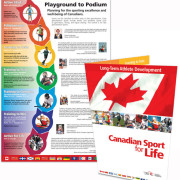LONG TERM ATHLETE DEVELOPMENT AND RECREATIONAL PARTICIPATION
This is a good time of year for parents to become familiar with the Canadian Sport Centres Long Term Athlete Development (LTAD) program. This program will assist us to understand how we can help our children to get the most out of their sports and activities. Too many of our children are sitting on the sidelines not participating in regular activity or sport. On the other end of the spectrum to many children are specialized into one sport far to early in the human development process.
The LTAD focuses on the general framework of athlete development with special reference to growth, maturation and development, trainability, and sport system alignment and integration. The report states that the need for LTAD arises in part from the declining international performance of Canadian athletes in some sports and the difficulty other sports are having in identifying and developing the next generation of internationally successful athletes. It goes on to say that participation in recreational sport and physical activity has been declining and physical education programs in the schools are being marginalized. The movement patterns and skills that we learn from birth to approximately age 12 are invaluable to our later success whether are a weekend warrior or a high level athlete. We all know the importance of regular physical activity, so I ask – why are we not finding ways for our children to participate on a more regular basis? Regular activity is most important in the early years so that each child can develop the basic fundamentals of movement…these basic fundamentals make it so much easier to participate in activities at any age.
The LTAD consists of 7 stages. The first 3 encourage physical literacy and sport for all:
1. Active start 2. FUNdamentals 3. Learning to train
Physical literacy – refers to competency in fundamental motor skills and fundamental sport skills
The next 3 focus on excellence:
4. Training to train 5. Training to compete 6. Training to win
The final stage encourages life long physical activity:
7. Active for life
This model is designed to identity and develop international level competitors for Canada. It is very important to note that another goal of this model is to create skills that allow each and every Canadian to continue life-long participation in sport or to at least remain active for life in a variety of physical activities.
The first three stages of this model are for ALL children as having base physical literacy skills are important for basic health and wellness. We will cover these skills in another newsletter – at this time it is important to note that these skills are used each and every day in all of our life stages. I see rehab clients each day that struggle with these basic skills as a result of not being active and participating as children or at least getting proper instruction during this first developmental stage. It is almost impossible to measure but I am sure this lack of physical literacy skills leads to some of the injuries and pains we have later in life. Not having these skills also makes it much harder to recover from an injury – I have clients who tell me they can’t “feel” what I am asking them to feel…
The middle three stages teach young athletes how to train, then to compete and finally to win. These stages are based on the athletes developmental age rather than chronological age and also includes proper recovery plans based on training age and biological parameters. For the most part we specialize our athletes in one sport way to early in their young lives and then make another mistake by trying to train them as little adults. Young athletes require coaches and trainers that understand growth and development and ensure proper loading and intensity for where they are on their own development path. I see far to many young athletes who have incorrect movement patterns and then are trained with high intensity and heavy load and if I am seeing them it means they are in pain and injured.
The final stage is obvious as the more active we are the better health and wellness we achieve…all the skills and patterns we learn early allow us to feel comfortable participating in a wide variety of activities.
Over the summer we will look at a number of aspects that make up the LTAD program and see if we can learn from Canada’s top sport scientists…




